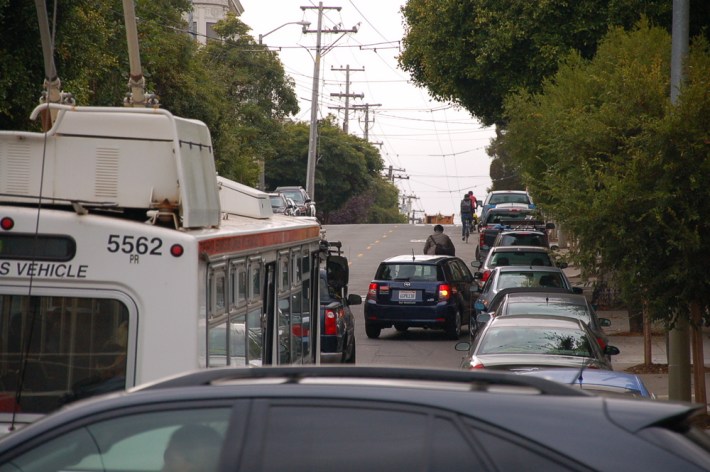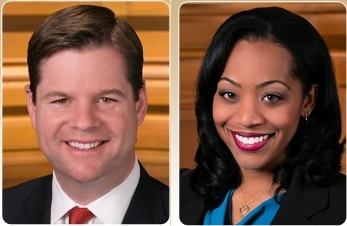Supes Farrell and Cohen Have Yet to Grasp Why Free Parking Hurts SF
5:42 PM PDT on May 6, 2013
Mark Farrell and Malia Cohen emerged as the most vocal proponents of free car parking on the San Francisco Board of Supervisors at a hearing on parking meters last week. Farrell called the hearing in February based on an admittedly "unfounded" suspicion that the SF Municipal Transportation Agency was planning to install parking meters in District 2, which he represents.
Despite the traffic dysfunction caused by free parking, which leads motorists to cruise fruitlessly in search of an open space, Cohen made her anti-parking meter stance clear at the introduction of the hearing. "I'm looking forward to, possibly, [SFMTA Director] Ed Reiskin saying, 'I quit, you won, we're not going to be doing parking meters,'" she said, eliciting applause from an audience composed mostly of the city's usual stable of free parking activists.
Electeds like Farrell and Cohen still see parking as an entitlement for drivers, and tend to resist any effort to encroach on that entitlement. Based on what they said at the hearing, they believe the amount of driving is fixed, and that the demand for car parking is a natural force that must be accommodated, not managed to achieve goals like traffic reduction, transit efficiency, and street safety. They say they won't tolerate parking reform unless Muni is first improved to their standards. (Oddly, we never seem to hear these folks actually push for more Muni funding, or call for safer streets for walking and biking.)
Meanwhile, the SFMTA's SFPark program has enjoyed broad political support where it has replaced existing parking meters with smart meters. Those meters adjust prices to demand throughout the day to keep about one parking space open on every block and provide multiple payment options. Prices have dropped about as often as they've been raised, so SFPark has actually saved motorists money and reduced citations.
While supervisors and the mayor have gotten behind SFPark as a symbol of San Francisco's innovation, that's not the case when it comes to converting free parking spaces to SFPark meters -- even in neighborhoods like the northeast Mission, where drivers circle around endlessly for spots on weekday mornings.
At the hearing, Farrell and Cohen waved the flag for the camp that insists San Franciscans shouldn't pay for car storage. "What do you do first: Do you make public transportation so attractive that people will voluntarily choose to abandon their cars, or leave them at home, and take public transportation?" said Farrell. "Or do you make it so challenging and frustrating to drive a car, with increased parking rates and what have you, that people are -- this is extreme, but -- coerced out of their cars? I think I hear from a lot of folks that it's the latter, not the former."
The problem with that assertion is that free parking is itself a subsidy that leads more people to drive, creating a traffic-clogged street environment that degrades transit service and makes bicycling unpleasant. That only further coerces people into cars. So while it's clear that Muni, walking, and biking conditions do need to be improved, continuing to give away in-demand parking spaces for free only perpetuates the vicious cycle.
"We have a charter mandate to" manage parking, said Reiskin. "It would be irresponsible of us to do otherwise."

For decades, the city didn't pursue this mandate -- its parking policy was to keep prices low despite rising demand, and it's the system that most, like Farrell and Cohen, have become used to. "At least two generations of transportation planners worked to convince everyone that parking demand and auto trips are inelastic, and demand is unaffected by price or availability," said Tom Radulovich, executive director of Livable City. "Now folks like Ed are trying to convince us that parking works like pretty much everything else."
For those who truly need to drive the most, Reiskin pointed out that charging for parking according to demand is the best way to ensure it's readily available for them. If the SFMTA charges some fee to rent prime parking spots, people who don't absolutely need to drive or own a car are more likely to consider other options. In addition, those who do need to drive will be less likely to occupy their spot all day, opening it up for use by others.
"I do believe that we can accommodate many more trips by modes other than automobile," said Reiskin, "so that when people do need to drive in a car, they can get to where they're going and they can park their car."
Cohen and Farrell have acknowledged that parking meters are good for retail businesses, as they increase turnover for customers, but insist that they don't belong on streets that don't have retail. But whether there's retail or not, free parking in neighborhoods where spaces are saturated will still clog streets with drivers circling for spots. It hurts those neighborhoods and there's no reason to perpetuate that dysfunction. Unfortunately, state law forces the SFMTA to keep parking permits ridiculously cheap, and the city gives them out in unlimited numbers, so meters are currently the only effective way to manage demand for street parking.

Unsurprisingly, the cast of speakers at the hearing's public comment period consisted of a group of familiar foes of the SFMTA's recent efforts to remove or charge for parking -- from ENUF, to church leaders who fought Sunday meters, to Save Polk Street. Their consistent message was that driving and free parking are essential to family life and commerce in the city.
But the insistence that San Franciscans don't have the option of driving less, or can't pay as little as 50 cents an hour to rent a slice of prime real estate, is farcical in a city where 70 percent of households own one or zero cars and 30 percent are fully car-free, while 97 percent of downtown driving is done by people with household incomes of more than $50,000 per year.
As D9 Supervisor David Campos, who has mostly taken a neutral position on the expansion of parking meters in the northeast Mission, pointed out: "There are a number of families for whom driving a car may not be an option, financially... who don't have the luxury of being able to afford to buy a car and can't actually use anything other than Muni."
So far, no supervisor has had the courage to vocally support more parking meters. Supervisor Eric Mar, who noted that he's a "big supporter of our transit-first policy," did say he thinks "a lot of the planning that's gone on by really smart and wise people within the MTA should be looked at as not a threat to neighborhoods, but a starting point to be able to find some common ground."
San Franciscans need leaders willing to say that the status quo of free parking, which induces traffic and benefits a disproportionately wealthy segment of the population, has hurt the city for far too long. But it won't end until elected officials like Cohen and Farrell drop the outmoded pandering and instead stand behind progressive efforts like SFPark -- even when it feels politically risky.
Stay in touch
Sign up for our free newsletter




